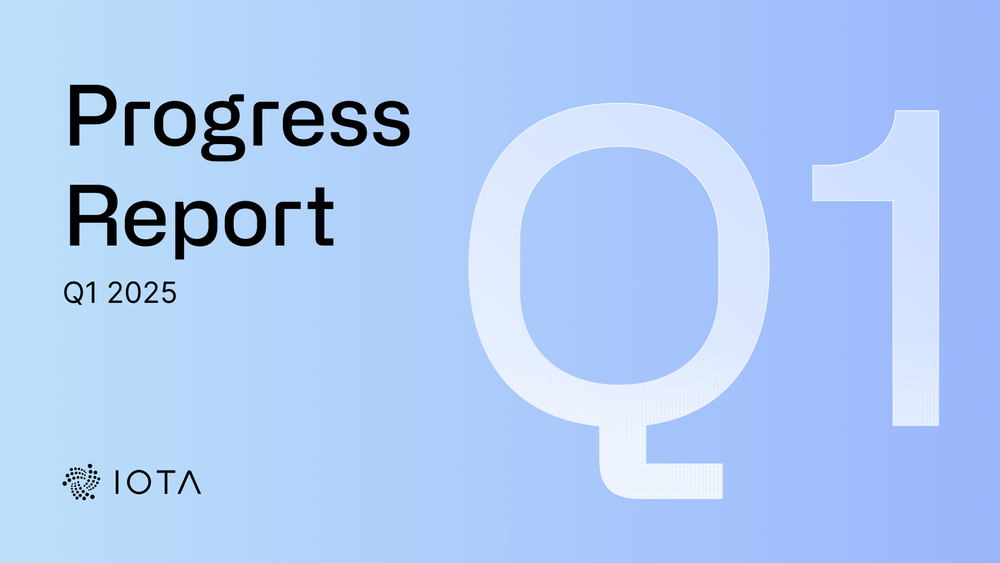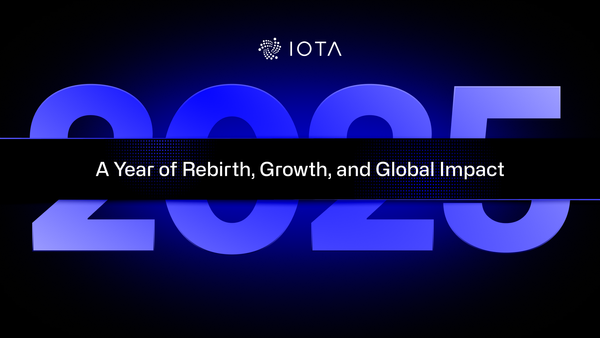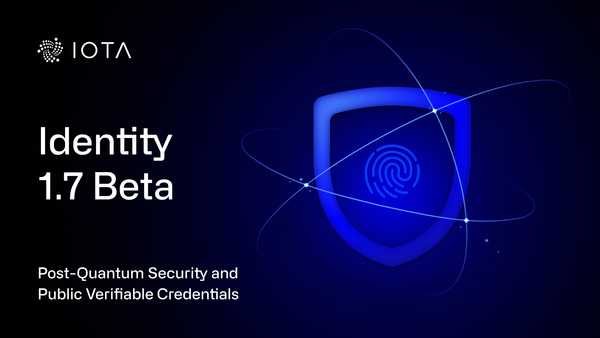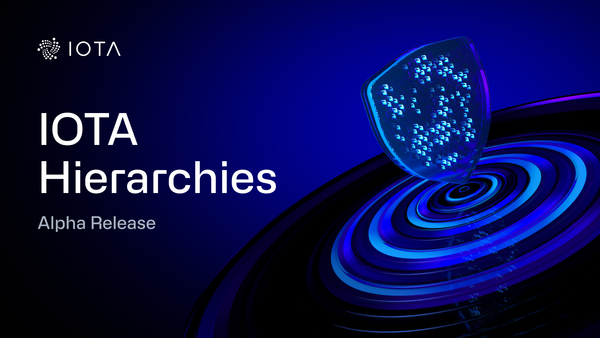Q1 2025 Progress Report
Q1 2025 was a productive quarter for the IOTA Foundation. With the Mainnet launch on the horizon, teams across the organization – from R&D to Ecosystem, Product, Legal, and Communications – worked in sync to finalize critical infrastructure, onboard partners, grow the community, and accelerate real-world adoption. IOTA is entering Q2 with strong momentum, readiness, and a clear path forward with the much-anticipated launch of IOTA Rebased.
Research & Development
The first quarter of 2025 has been a productive period for the IOTA Foundation's Research and Development department. Our teams made significant progress across several critical areas, preparing the project for the upcoming Mainnet release.
The Node Team has been focused on maintenance and integrating key upstream improvements from Sui to enhance node reliability. A major accomplishment was the collaborative overhaul of the continuous integration pipeline, streamlining delivery across the organization. The team also added iota-proxy to collect all validator metrics, as well as additional hardware metrics to Prometheus, in order to see that the validators are running proper hardware and for enhanced node health monitoring, alongside fully updating node operation documentation and resolving numerous bugs and stability issues.
Significant progress was made by the Consensus Team on our Starfish consensus protocol, an evolution of Mysticeti. The Starfish paper is close to release. Through extensive simulations, Starfish demonstrated greater robustness, particularly under conditions with Byzantine behavior, ensuring stable latency compared to Mysticeti. Additionally, in scenarios without Byzantine behavior, Starfish can outperform Mysticeti in terms of throughput. The top-stakers committee selection mechanism was also implemented, providing a fairer system by allowing higher-stake validators to replace lower-stake validators.
The Protocol Research Team spent significant effort prototyping advanced sequencing and scheduling algorithms to boost throughput, aiming to deploy these enhancements in Q2. The team also established clear validator performance metrics, paving the way for performance-based rewards distribution. To facilitate rigorous testing, they developed tools for generating spam loads and started preliminary evaluations of local fee markets based on object congestion.
This quarter, the Smart Contract Platform Team primarily addressed findings from the Sherlock audit, resolving issues in migration tools and key node software components. They contributed substantially to improvements in our continuous integration pipeline and released the Stardust Indexer, essential for indexing migrated ledger objects. Additionally, the team continued refining the genesis ceremony playbook, documenting precise guidelines for the upcoming mainnet launch.
The reintroduction of the IOTA Improvement Proposal repository was another significant milestone. The repository will serve as our central hub to publicly communicate protocol changes, invite feedback, and encourage community-driven ideas and contributions. It aims to provide greater transparency regarding the direction of protocol developments and foster active community participation in shaping the future of IOTA.
The ISC Team focused primarily on ensuring compatibility between IOTA EVM and IOTA Rebased, successfully deploying this compatible version to testnets. Currently, the team is undergoing a Sherlock audit aimed at verifying the security and soundness of this implementation. Additionally, migration tools were developed for smoothly transitioning data from the Stardust-compatible version to IOTA Rebased, accompanied by incremental improvements to the existing production IOTA EVM.
To better support developers interested in building with IOTA, the Developer Experience Team expanded documentation and published comprehensive tutorials for the Move programming language. The team also actively hosted several office-hour sessions on Discord to directly engage and assist the developer community.
In preparation for the mainnet release, the Tooling Team dedicated substantial efforts to developing user-facing applications and completing security audits with Zokio for the browser extension, TypeScript SDK, and backend services. The team also involved community members in rigorous testing, ensuring smooth asset migrations ahead of the launch.
The DevOps Team improved infrastructure resilience, notably enhancing monitoring capabilities to achieve greater visibility and reliability. This foundational work ensures robust support for upcoming network developments.
A key Cross-Team Effort this quarter was internally conducting dry runs and thorough testing of the genesis ceremony for the upcoming mainnet launch. Teams meticulously documented and simulated the required steps, and these internal trials will continue with an external dry run involving community validators scheduled for early April.
Product Adoption
The Product Adoption Department continues to drive the scalable adoption of the IOTA Mainnet through two key pillars: Product Management & Development and Partnerships & Engagements. By advancing a versatile suite of open-source, industry-agnostic tools and nurturing strategic collaborations, we aim to simplify blockchain integration and foster real-world use of IOTA’s technology.
A significant product milestone was the release of the IOTA Gas Station (Repository, Blogpost, Docs), a tool that allows developers and businesses to sponsor transaction fees for users. This open-source solution removes onboarding friction by eliminating gas fees, thereby streamlining the user experience and enabling more accessible interactions with dApps on the IOTA Network.
On the digital identity front, IOTA Identity has successfully migrated to be compatible with networks based on IOTA Move, including the IOTA Rebased Testnet and the upcoming IOTA Rebased Mainnet (Repository, Blogpost, Docs). Now aligned with W3C’s DID standards, the alpha release delivers an immutable, trust-minimized infrastructure that empowers users with control over their personal data. This positions IOTA Identity as a foundation for privacy-preserving, decentralized identity solutions.
The launch of the Business Innovation Program marks a key advancement in supporting real-world adoption. With up to €100,000 in funding per project and end-to-end support, the initiative has attracted high daily application volumes, underlining the strong interest in building on the IOTA Mainnet. Three projects have already been accepted, with more to be announced soon. Applications are open until December 31, 2025, but early submission is encouraged due to limited availability: apply here.
Trade Logistics and Information Pipeline (TLIP)
In the first quarter of this year, TLIP achieved a significant breakthrough in its integration with Kenyan stakeholders: the Kenya Revenue Authority has successfully set up a TLIP node. This marks a crucial step toward seamless, secure, and efficient data exchange within the trade ecosystem. Integrating TLIP nodes into legacy data systems – particularly those of key government agencies – grants immediate access to a trusted digital infrastructure. With an easy setup, a TLIP node ensures secure data permissions, encryption, auditability, and controlled access while upholding industry standards. It empowers stakeholders with privacy-preserving, transferable, and verifiable trade data, fostering greater efficiency and compliance across global supply chains.
Another key development during this period was the signing of an NDA with the Kenya Revenue Authority to advance digital identity efforts. Strengthening digital identity is essential for streamlining trade transactions, reducing administrative friction, and enhancing interoperability with Kenya’s existing tax and trade infrastructure.
With these developments, TLIP continues to strengthen its role in enabling trusted, efficient, and transparent trade processes, supporting both local traders and international supply chain stakeholders. As the year continues, the focus remains on deepening integrations, expanding user adoption, and unlocking further efficiencies through digital innovation.
Ecosystem Department
The Ecosystem Department is dedicated to expanding the IOTA Web3 ecosystem by onboarding new builder teams, managing relationships with existing projects, integrating infrastructure, and supporting exchange relations. The team also leads marketing, events, community engagement, and the IOTAlabs Grant Program, playing a central role in driving momentum and supporting community-driven growth initiatives.
This quarter, significant efforts went into preparing for the upcoming L1 Mainnet launch, with new validators joining the Public Testnet and integrations completed for key infrastructure components such as Pyth Oracles, explorers, and RPC providers. On the IOTA EVM front, a new RPC Provider was added in partnership with ANKR, while analytics tools from Nansen and Lukka went live. The department also ensured major exchange readiness for the rebased upgrade and launched the IOTA Moveathon hackathon, which is currently underway.
The Business Development team focused on fostering connections within the Move VM ecosystem, engaging with infrastructure providers and developers from networks like Sui, Aptos, and Movement. These engagements helped position IOTA’s offerings while promoting collaboration opportunities tied to the rebased upgrade, the grant program, and ongoing hackathon events.
Season 2 of the IOTA Grants Program launched at the start of 2025, drawing in 54 applications. Two grants have already been approved, with more expected soon. In parallel, the team has been preparing a new Request for Proposals system to streamline future funding opportunities and provide clearer guidance for applicants.
On the community side, the "Return to IOTA" campaign grew the iotalabs account to over 12,000 followers, while pre-launch content and engagement efforts are ramping up. Two BuildSpheres –Trappist-1 and Uruk Bartas – were successfully held, sparking collaboration within the community. Weekly IOTA Builders Hour sessions on Discord continue to foster education and engagement, and the newly launched IOTA Ambassador Program, supported by a dedicated Telegram channel, is further strengthening community ties.
Legal & Regulatory Affairs
In Q1, the IOTA Foundation joined the Global Blockchain Business Council, particularly to strengthen our engagement in the United States. The Legal and Regulatory Affairs Department has also continued its regulatory work with key stakeholders across the world:
- Provided feedback to a consultation by the International Organization of Securities Commissions regarding “finfluencers”, emphasizing balanced regulatory frameworks that protect retail investors while supporting innovation. Read the blog post here.
- Submitted detailed comments and recommendations to Kenya's Draft National Policy and Virtual Asset Service Providers Bill, advocating alignment with international standards and best practices.
- Provided targeted input on the Australian Transaction Reports and Analysis Centre’s amended AML/CTF rules, specifically addressing provisions related to virtual assets to promote clear, modern, and internationally aligned regulatory practices.
- Recommended an optional certification model for smart contracts in response to the French Financial Markets Authority and the French Prudential Supervision and Resolution Authority’s consultation, advocating a flexible, risk-based approach that maintains innovation and decentralization in the blockchain industry.
The Legal and Regulatory Affairs Department also collaborated with several industry associations, including a response by the International Association of Trusted Blockchain Association to the UK FCA's Discussion Paper on regulating cryptoassets, focusing on admissions, disclosures, and market abuse regimes.
Communications
For the first quarter of 2025, the IOTA communications team posted over 450 messages, generating over four million organic impressions and 64 thousand engagements, which was a slight reduction of 8% from the previous quarter, in part due to the exceptionally high end of 2024 volume of publication, and a lower volume of announcements due to IOTA teams working hard on releases for Q2.
That being said, thanks to advertisement efforts funded by TEA, paid visibility doubled this quarter to 43 million impressions, while generating nearly 105 thousand engagements. These efforts generated visibility and inscriptions for the upcoming Moveathon and the latest Identity Release.
Outlook
As highlighted above, the IOTA Foundation has been actively preparing for a major upgrade to the IOTA network: the transition to the Move-based protocol. The IOTA Rebased upgrade marks a pivotal shift in the Foundation’s strategic focus.
Beyond ensuring a stable environment, the R&D team will continue enhancing the protocol through several ongoing initiatives.
On the adoption and business development front, key preparatory milestones have been achieved and will enable us to take the next steps leading towards integration and product releases.
Another significant milestone will be the clearer articulation and communication of the Foundation’s focus areas – made possible by two separate smart contract environments that IOTA will feature post-rebase; namely Move-based and EVM-based smart contracts.
With the mainnet reaching production readiness, the Ecosystem and Developer Experience teams will be positioned to ramp up the Move builder ecosystem and facilitate broader dApp deployments.
With much of the core technology now production-grade, the Foundation’s focus is shifting from underlying development to enabling real-world utility and enhancing developer tooling. The IOTA Rebased protocol upgrade closes one chapter and opens a new era for the IOTA mainnet – which everyone in the IOTA Foundation is looking forward to.
If you do as well, be sure to join our community on Discord or follow us on X for current updates on the work of our various teams and working groups.




